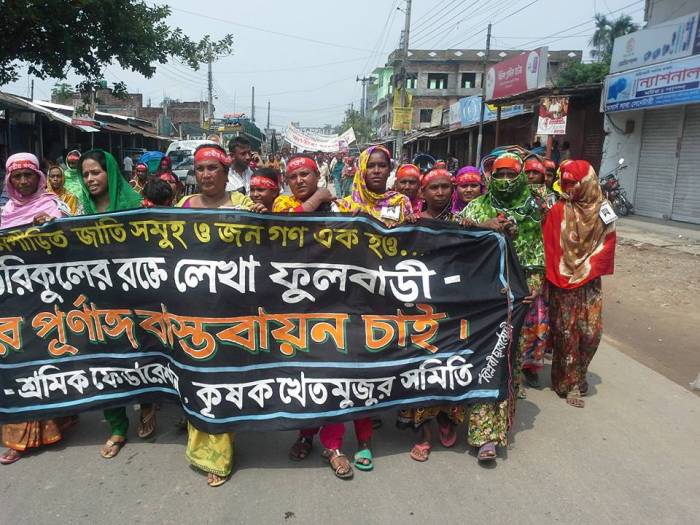
Families of the victims and women protesters march towards Shahid Minar in Phulbari to pay tribute. 26 August 2015. Photo: Anonymous
An open-pit coal mine project in Phulbari, Bangladesh proposed by Asia Energy, now renamed as Global Coal Management (GCM) set off a chain of protests that ultimately led to its cancellation in 2006. But the struggle to “Save Phulbari” came at a price.
Phulbari is one of the most fertile agricultural regions of Bangladesh. If the project went ahead, it would have destroyed almost 4,900 hectares of the most fertile farmlands in Dinajpur district, often referred to as Bangladesh’s rice bowl. The coal mine would have also immediately displaced over 50,000 people with as many as 220,000 more being displaced over time as mining water pumps drain the groundwater wells. The Phulbari coal mine would have also displaced 50,000 additional people of 23 different Indigenous groups. The Indigenous community played a crucial role in resisting the mine.
On 26th August, 50,000 people took part in a rally against the proposed coal mine. Unprovoked firing by the paramilitary martyred three people and left 200 injured.
“We will give our lives, but we will not leave this place. We will not allow the mine to happen. The government can take as many dead bodies as they want, we won’t leave the village.” —a villager threatened with forced eviction in Phulbari.
An eyewitness account from Phulbari
“We were about 30,000 people – all local farmers, day labourers and members of the local aboriginal communities who marched to protest outside the local Asia Energy office,” Anu Muhammad who had been leading the protests told The Observer.
“As evening descended we started back towards the town center. Ten minutes had passed when we suddenly heard the crack of rifle shots behind us. It was utter chaos. The police were charging and there were dead bodies on the street,” Muhammad told the Guardian in 2006.
The open-pit coal mine project was eventually canceled after the government entered into a six-point agreement with the NCBD, the organisation spearheading the protests. But GCM has been lobbying to get permission from the Bangladesh government to start mining operations. In 2010, The Guardian published a story quoting a Wikileaks cable that the US Ambassador to Bangladesh had asked the then chief energy adviser to allow the Phulbari coal project to resume.
Current Status of the project:
On November 27, 2018, GCM Resources announced that it had signed an agreement with Power Construction Corp Of China Ltd to develop a coal mine and electricity plant in Phulbari, Bangladesh. Engineering construction firm Power China will undertake feasibility and viability studies of the integrated coal mine and power plant. GCM Resources plc has signed a second Joint Venture Agreement on 15 March 2019 with Power Construction Corporation of China, Ltd for the development of an additional 2×1,000MW coal-fired power plant project in Phulbari. The second joint venture agreement is in addition to the initial agreement signed with Power China as announced on 17 January 2019.
Indigenous people and activists in Phulbari are still opposed to GCM resuming proposed mining activities in Phulbari and had vowed to resist it once again.
Every year on August 26, communities in Bangladesh and in the diaspora commemorate this day as “Phulbari Day”. This year, protests and rallies are being held in Phulbari, Bangladesh while diaspora groups in London are going to hold a “Green Vigil” outside the London Stock Exchange to demand the delisting of GCM.